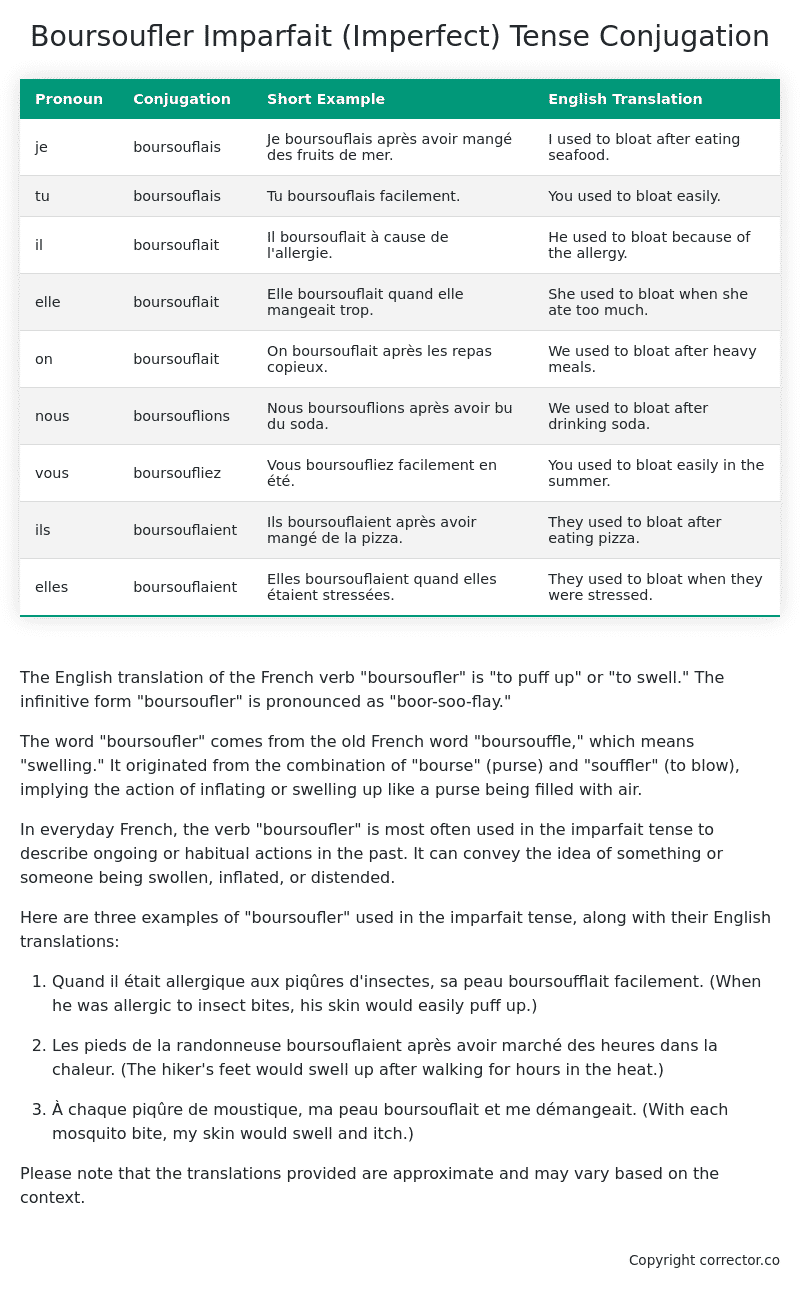Imparfait (Imperfect) Tense Conjugation of the French Verb boursoufler
Introduction to the verb boursoufler
The English translation of the French verb “boursoufler” is “to puff up” or “to swell.” The infinitive form “boursoufler” is pronounced as “boor-soo-flay.”
The word “boursoufler” comes from the old French word “boursouffle,” which means “swelling.” It originated from the combination of “bourse” (purse) and “souffler” (to blow), implying the action of inflating or swelling up like a purse being filled with air.
In everyday French, the verb “boursoufler” is most often used in the imparfait tense to describe ongoing or habitual actions in the past. It can convey the idea of something or someone being swollen, inflated, or distended.
Here are three examples of “boursoufler” used in the imparfait tense, along with their English translations:
-
Quand il était allergique aux piqûres d’insectes, sa peau boursoufflait facilement.
(When he was allergic to insect bites, his skin would easily puff up.) -
Les pieds de la randonneuse boursouflaient après avoir marché des heures dans la chaleur.
(The hiker’s feet would swell up after walking for hours in the heat.) -
À chaque piqûre de moustique, ma peau boursouflait et me démangeait.
(With each mosquito bite, my skin would swell and itch.)
Please note that the translations provided are approximate and may vary based on the context.
Table of the Imparfait (Imperfect) Tense Conjugation of boursoufler
| Pronoun | Conjugation | Short Example | English Translation |
|---|---|---|---|
| je | boursouflais | Je boursouflais après avoir mangé des fruits de mer. | I used to bloat after eating seafood. |
| tu | boursouflais | Tu boursouflais facilement. | You used to bloat easily. |
| il | boursouflait | Il boursouflait à cause de l’allergie. | He used to bloat because of the allergy. |
| elle | boursouflait | Elle boursouflait quand elle mangeait trop. | She used to bloat when she ate too much. |
| on | boursouflait | On boursouflait après les repas copieux. | We used to bloat after heavy meals. |
| nous | boursouflions | Nous boursouflions après avoir bu du soda. | We used to bloat after drinking soda. |
| vous | boursoufliez | Vous boursoufliez facilement en été. | You used to bloat easily in the summer. |
| ils | boursouflaient | Ils boursouflaient après avoir mangé de la pizza. | They used to bloat after eating pizza. |
| elles | boursouflaient | Elles boursouflaient quand elles étaient stressées. | They used to bloat when they were stressed. |
Other Conjugations for Boursoufler.
Le Present (Present Tense) Conjugation of the French Verb boursoufler
Imparfait (Imperfect) Tense Conjugation of the French Verb boursoufler (You’re reading it right now!)
Passé Simple (Simple Past) Tense Conjugation of the French Verb boursoufler
Passé Composé (Present Perfect) Tense Conjugation of the French Verb boursoufler
Futur Simple (Simple Future) Tense Conjugation of the French Verb boursoufler
Futur Proche (Near Future) Tense Conjugation of the French Verb boursoufler
Plus-que-parfait (Pluperfect) Tense Conjugation of the French Verb boursoufler
Passé Antérieur (Past Anterior) Tense Conjugation of the French Verb boursoufler
Futur Antérieur (Future Anterior) Tense Conjugation of the French Verb boursoufler
Subjonctif Présent (Subjunctive Present) Tense Conjugation of the French Verb boursoufler
Subjonctif Passé (Subjunctive Past) Tense Conjugation of the French Verb boursoufler
Subjonctif Imparfait (Subjunctive Imperfect) Tense Conjugation of the French Verb boursoufler
Conditionnel Présent (Conditional Present) Tense Conjugation of the French Verb boursoufler
Conditionnel Passé (Conditional Past) Tense Conjugation of the French Verb boursoufler
Conditionnel Passé II (Conditional Past II) Tense Conjugation of the French Verb boursoufler
L’impératif Présent (Imperative Present) Tense Conjugation of the French Verb boursoufler
L’impératif Passé (Imperative Past) Tense Conjugation of the French Verb boursoufler
L’infinitif Présent (Infinitive Present) Tense Conjugation of the French Verb boursoufler
L’infinitif Passé (Infinitive Past) Tense Conjugation of the French Verb boursoufler
Le Participe Présent (Present Participle) Tense Conjugation of the French Verb boursoufler
Le Participe Passé (Past Participle) Tense Conjugation of the French Verb boursoufler
Struggling with French verbs or the language in general? Why not use our free French Grammar Checker – no registration required!
Get a FREE Download Study Sheet of this Conjugation 🔥
Simply right click the image below, click “save image” and get your free reference for the boursoufler imparfait tense conjugation!

Boursoufler – About the French Imparfait Tense
NOTE: To take a deep dive into all the French tenses then see our article on Mastering French Tense Conjugation.
Formation of the Imparfait Tense
For regular -er verbs:
For regular -ir verbs
For regular -re verbs
Common Everyday Usage Patterns
Description of Past Habits
Background Information
Mental and Emotional States
It’s employed to express emotions, thoughts, or physical sensations in the past. For example: “J’étais content quand il est arrivé.” (I was happy when he arrived.)
Ongoing Actions
Points to Note About the Imparfait Tense
Passé Composé vs. Imparfait
Conditional
Si Clauses
Narration
I hope you enjoyed this article on the verb boursoufler. Still in a learning mood? Check out another TOTALLY random French verb imparfait conjugation!


